
Soil and Water Research
Scope & Guideline
Your Gateway to Cutting-edge Soil and Water Research
Introduction
Aims and Scopes
- Soil and Water Quality Assessment:
Research focusing on the assessment of soil and water quality, including the effects of pollutants, heavy metals, and organic contaminants on environmental health and agricultural productivity. - Sustainable Agricultural Practices:
Studies investigating irrigation techniques, soil management practices, and crop selection aimed at improving water use efficiency and enhancing agricultural sustainability. - Erosion and Sediment Control:
Exploration of soil erosion mechanisms, sediment yield prediction, and management strategies to mitigate land degradation and promote soil conservation. - Innovative Remediation Techniques:
Research on novel approaches for the remediation of contaminated soils and waters, including bioremediation, nanotechnology, and green synthesis methodologies. - Climate Change Impact and Adaptation:
Investigations into the effects of climate variability on soil and water resources, including the development of adaptive strategies for agricultural systems in changing climates. - Geospatial Analysis and Decision Support Systems:
Utilization of geospatial tools and modeling techniques to assess environmental risks, manage water resources, and support decision-making in land-use planning.
Trending and Emerging
- Microplastic and Anthropogenic Pollution Research:
There is a growing interest in understanding the sources, impacts, and remediation of microplastics and other anthropogenic pollutants in soil and water systems, reflecting increased awareness of environmental contamination. - Innovative Water Management Strategies:
Research focusing on advanced irrigation methods, water conservation practices, and the integration of renewable energy in water management systems is emerging, highlighting the need for sustainable solutions in water-scarce regions. - Climate Change Adaptation in Agriculture:
An increasing number of studies are addressing the impacts of climate change on agricultural practices and water resources, emphasizing adaptation strategies that enhance resilience in farming systems. - Geospatial Technologies in Environmental Research:
The integration of geospatial analysis and modeling techniques is trending, with researchers utilizing these tools for better decision-making in soil and water management and environmental assessments. - Soil Health and Microbial Diversity Studies:
Research exploring the relationship between soil health, microbial diversity, and ecosystem services is gaining traction, reflecting a holistic approach to understanding soil ecosystems.
Declining or Waning
- Traditional Soil Classification Techniques:
The emphasis on conventional soil classification methods has decreased as newer techniques, such as machine learning and geospatial analysis, gain traction, reflecting a shift towards more innovative and efficient approaches. - General Environmental Pollution Studies:
Research that broadly addresses environmental pollution without a specific focus on soil or water quality has become less frequent, as the journal increasingly prioritizes targeted studies that link pollution to specific remediation strategies. - Historical Land Use Studies:
While historical analyses of land use provided valuable insights, recent publications have shifted towards contemporary issues, particularly those related to climate change and current agricultural practices. - Basic Agricultural Practices:
Papers focusing solely on basic agricultural practices without addressing sustainability or innovative technologies have seen a decline, as the journal seeks to highlight more advanced and sustainable agricultural research.
Similar Journals

Terra Latinoamericana
Fostering Dialogue on Soil Health and SustainabilityTerra Latinoamericana is a prominent academic journal published by the Mexican Society of Soil Science, focusing on the essential disciplines of soil science, biochemistry, and ecology. With a dedicated commitment to open access since 2014, this journal provides a platform for researchers and professionals to disseminate and access cutting-edge research aimed at understanding soil interactions, environmental pollution, and ecosystems within Latin America. The journal holds a Q4 ranking in multiple categories, including Ecology and Soil Science, reflecting its growing presence in the academic landscape and its role in fostering scholarly communication within these fields. Though currently positioned in the lower quartiles, Terra Latinoamericana presents a valuable opportunity for emerging scholars and experienced researchers alike to contribute impactful findings and engage with key issues affecting soil health and ecological sustainability in diverse environments. By promoting innovative research and collaborative dialogue, this journal continues to shape the future of soil science and related disciplines, making it an indispensable resource for the scientific community.

EURASIAN SOIL SCIENCE
Exploring the depths of soil dynamics and health.EURASIAN SOIL SCIENCE, published by PLEIADES PUBLISHING INC, is a premier journal dedicated to advancing knowledge in the fields of soil science and earth-surface processes. With an ISSN of 1064-2293 and an E-ISSN of 1556-195X, this journal has been a key resource for researchers and professionals from its inception in 1992 and continues to thrive as it converges toward 2024. Situated in the United States, EURASIAN SOIL SCIENCE has achieved notable recognition, attaining a Q2 ranking in both Earth-Surface Processes and Soil Science categories as of 2023. Its Scopus rankings further underscore its importance, with Earth and Planetary Sciences placing it at #81/179 and Agricultural and Biological Sciences ranking it at #80/159. Engaging a global audience, this journal publishes cutting-edge research articles, reviews, and case studies that address critical issues related to soil health, conservation, and management. Though currently not open access, the journal offers valuable insights and fosters collaboration among scientists and practitioners, underscoring its vital role in enhancing the understanding of soil dynamics and sustainability.
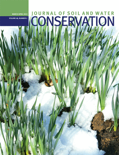
JOURNAL OF SOIL AND WATER CONSERVATION
Fostering collaboration for sustainable land management.The JOURNAL OF SOIL AND WATER CONSERVATION, published by the Soil Water Conservation Society, is a leading peer-reviewed journal dedicated to the critical fields of agronomy, soil science, and water conservation. With its inception in 1973 and a convergence period extending to 2024, the journal plays a pivotal role in disseminating innovative research, management practices, and policy analysis aimed at promoting sustainable land and water resource management. The journal boasts an impressive Impact Factor and ranks in the Q1 and Q2 quartiles across key categories, including Agronomy and Crop Science, Nature and Landscape Conservation, and Water Science and Technology. It serves as an essential platform for researchers, professionals, and students to engage with cutting-edge findings that address pressing environmental challenges. Through its commitment to advancing the science of soil and water conservation, this journal remains a vital resource for enhancing ecological integrity and promoting sustainable agricultural practices.
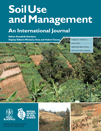
SOIL USE AND MANAGEMENT
Championing excellence in agronomy and crop science.SOIL USE AND MANAGEMENT is a premier academic journal published by Wiley, focusing on the critical domains of Agronomy, Crop Science, Pollution, and Soil Science. With an ISSN of 0266-0032 and an E-ISSN of 1475-2743, the journal has established itself as a vital resource in the field since its inception in 1985. Operating from its U.S. headquarters in Hoboken, NJ, SOIL USE AND MANAGEMENT boasts impressive Q1 rankings across its relevant categories, indicating its standing in the top tier of research journals. Notably, it is ranked 48th out of 406 journals in Agronomy and Crop Science and holds an 88th percentile position, as well as a commendable rank of 26th out of 159 journals in Soil Science, underscoring its influence and reach. This journal serves as an essential platform for researchers, professionals, and students dedicated to sustainable soil management practices and understanding soil's role in agricultural productivity and environmental health. Although it does not offer Open Access, its rigorous peer-review process ensures the publication of high-quality original research, reviews, and case studies critical for advancing knowledge and practice in the field. This journal is crucial for anyone engaged in soil science and its related disciplines, encouraging innovative approaches to challenges facing soil use and management today.
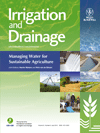
IRRIGATION AND DRAINAGE
Fostering dialogue and innovation in water resource management.IRRIGATION AND DRAINAGE, published by Wiley, is a prestigious academic journal that focuses on the critical fields of agronomy, crop science, and soil science. With an ISSN of 1531-0353 and an E-ISSN of 1531-0361, this journal serves as an essential platform for disseminating innovative research and insights relevant to the management of irrigation systems and drainage in agricultural practices. Based in the United Kingdom, the journal has shown a significant impact in its field, boasting a 2023 ranking in the Q2 quartile for both Agronomy and Crop Science and Soil Science. It ranks #149 out of 406 in Agricultural and Biological Sciences for Agronomy and Crop Science, and #66 out of 159 in Soil Science, placing it within the 58th to 63rd percentiles. This journal not only aims to advance knowledge in the sustainable management of water resources and soil health but also encourages open access to its content, making significant findings more accessible to researchers, professionals, and students alike. As it approaches its convergence period from 2001 to 2024, the importance of IRRIGATION AND DRAINAGE in shaping effective agricultural strategies continues to grow, fostering dialogue and innovation among its readership.

Transactions of the ASABE
Innovating practices for a resilient agricultural future.Transactions of the ASABE is a premier journal published by the American Society of Agricultural and Biological Engineers, specializing in innovative research and practical applications in the fields of agricultural and biological engineering. With an ISSN of 2151-0032 and E-ISSN 2151-0040, this journal has established a vital niche in disseminating high-quality scholarly content that addresses the complex challenges faced in agriculture and biological systems. The journal operates under an open access model, facilitating broad dissemination of research findings to a global audience. This commitment to accessibility is reflected in its coverage of diverse topics, including agriculture, soil science, food science, and environmental engineering. Although the journal's coverage in Scopus was discontinued in 2021, it once ranked among the top in its categories, indicating its significant contribution to advancing knowledge in these essential fields. Researchers, practitioners, and students are encouraged to engage with the Transactions of the ASABE to stay abreast of developments and foster collaboration in promoting sustainable engineering solutions.
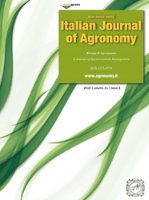
Italian Journal of Agronomy
Empowering the agricultural community with open access research.The Italian Journal of Agronomy is a prestigious, peer-reviewed outlet dedicated to advancing research and scholarship in the field of agronomy and crop science. Published by PAGEPRESS PUBL in Italy, this journal is committed to providing a platform for the dissemination of high-quality research since achieving its Open Access status in 2006. With an ISSN of 1125-4718 and an E-ISSN of 2039-6805, it is recognized for its contribution to the scientific community, boasting a commendable Q2 category ranking in Agronomy and Crop Science as of 2023. The journal's impressive Scopus ranking places it in the 75th percentile within General Agricultural and Biological Sciences and the 69th percentile in Agronomy and Crop Science, reflecting its significant impact and relevance. Covering a wide range of topics relevant to agriculture, from sustainability practices to innovative farming techniques, the Italian Journal of Agronomy serves as an essential resource for researchers, professionals, and students seeking to enrich their knowledge and contribute to the advancement of the agricultural sciences.
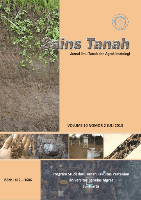
SAINS TANAH
Exploring Soil Science for Global ImpactSAINS TANAH is a renowned peer-reviewed journal that focuses on the fields of agronomy, soil science, and environmental studies, published by Universitas Sebelas Maret Surakarta in Indonesia. Established as an Open Access platform since 2001, it aims to disseminate high-quality research that addresses critical issues in soil health, crop management, and pollution, thereby fostering sustainable agricultural practices. With its current impact factor demonstrating a Category Quartile ranking of Q3 and Q4 in major areas such as Agronomy and Crop Science, Atmospheric Science, and Pollution, SAINS TANAH serves as an essential resource for researchers, professionals, and students dedicated to advancing knowledge and solutions in these vital fields. By providing a collaborative environment and upholding rigorous academic standards, the journal not only highlights the significance of Indonesian research contributions but also aims to connect local insights with global agricultural and environmental challenges.

WATER AIR AND SOIL POLLUTION
Exploring the intersections of water, air, and soil for a cleaner planet.Water Air and Soil Pollution is a leading peer-reviewed journal published by Springer International Publishing AG, focusing on the vital fields of environmental sciences, ecological modeling, and pollution management. Since its inception in 1971, the journal has contributed significantly to advancing knowledge in the interdisciplinary realms of Water Science and Technology, Environmental Chemistry, and Environmental Engineering. With an impressive history, the journal currently holds a Q2 quartile ranking in several categories, reflecting its high impact and relevance in these essential areas of research. Its rankings—such as #95 in Environmental Science: Water Science and Technology—illustrate its standing in the academic community. Researchers and practitioners alike can access a wealth of studies and reviews that aim to address pressing environmental concerns and foster sustainable practices, although the journal is not Open Access. Located in Switzerland, Water Air and Soil Pollution continues to be a critical resource for those dedicated to understanding and mitigating pollution, making it an indispensable tool for anyone engaged in ecological and environmental research.

CANADIAN JOURNAL OF SOIL SCIENCE
Cultivating Insights for Healthier EcosystemsThe Canadian Journal of Soil Science (ISSN: 0008-4271, E-ISSN: 1918-1841) is a premier publication in the field of soil science, proudly published by Canadian Science Publishing. Established in 1974, this esteemed journal aims to promote high-quality research and insights into the dynamic interactions within soil ecosystems, addressing pressing issues such as soil health, management, and sustainability. With an impressive 2023 category quartile ranking of Q2 in Soil Science and a Scopus ranking placing it in the 52nd percentile, this journal stands out as a key resource for researchers, professionals, and students alike. Although currently not open access, the journal provides valuable content that contributes to advancing the understanding of soil science, an essential discipline for agricultural innovation and environmental stewardship. As we approach its converged years through 2024, the Canadian Journal of Soil Science is poised to continue its pivotal role in disseminating impactful research and fostering a community dedicated to soil science excellence.